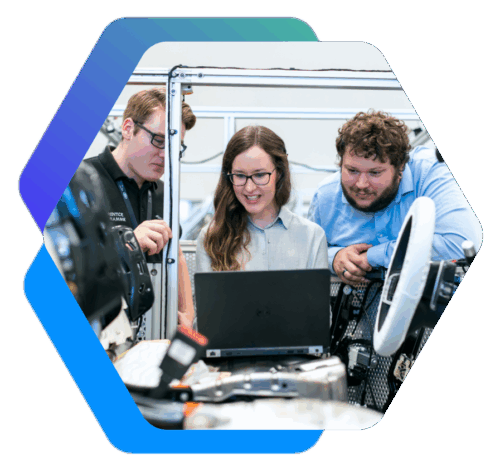Struggling with Niche Roles in Your Recruitment?
Why Plasma Control Physicists Can't Be Hired Like Marketing Managers
If your company is working on fusion energy, superconducting magnets, or other breakthrough technologies, you've likely experienced the unique challenge of recruiting for roles that barely existed five years ago. Finding a qualified "Plasma Control Physicist" isn't exactly covered in standard HR training.
You're developing technology that could change the world, but first you need to find the handful of people who understand what you're actually building. Standard recruitment approaches that work perfectly well for hiring marketing managers or software developers suddenly seem inadequate when you need someone who can operate equipment generating magnetic fields 50,000 times stronger than Earth's.
Understanding Your Recruitment Challenge
When you're hiring for roles requiring specific experience with magnetic f usion devices, MATLAB/Simulink proficiency, or knowledge of cryogenic systems, traditional recruitment metrics become inadequate. Your challenge isn't just finding qualified candidates - it's finding them within reasonable timeframes whilst maintaining the rigorous standards your technology demands.
usion devices, MATLAB/Simulink proficiency, or knowledge of cryogenic systems, traditional recruitment metrics become inadequate. Your challenge isn't just finding qualified candidates - it's finding them within reasonable timeframes whilst maintaining the rigorous standards your technology demands.
Consider the complexity of recruiting for fusion energy roles. The ST40 reactor operates at magnetic fields of 2.1 Tesla - approximately 50,000 times stronger than Earth's magnetic field. Personnel working with this equipment require comprehensive understanding of both theoretical physics and practical safety protocols for containing systems that generate enormous magnetic forces.
Your technical requirements aren't negotiable. You need genuine expertise, not people who can talk convincingly about plasma physics without truly understanding magnetic confinement principles.
The Recruitment Challenge for Specialist Positions
Standard recruitment approaches often prove insufficient for niche technical roles. Passive job board posting rarely attracts candidates with highly specific expertise, particularly when these professionals are typically engaged in complex research or development work.
Effective specialist recruitment requires proactive sourcing strategies. Data shows that targeted sourcing can reduce time-to-hire by up to 50% - a significant improvement when recruiting for roles with limited candidate pools.
Developing Technical Expertise Across Sectors
Recruiting effectively for specialist roles requires developing genuine understanding of complex technical fields. When working with fusion energy companies, recruitment teams must familiarise themselves with concepts like magnetic confinement fusion, plasma physics, and tokamak operations.
This knowledge development isn't superficial. Understanding that experience with magnetic fusion devices represents more valuable expertise than general plasma physics knowledge directly impacts recruitment success. Similarly, recognising that ANSYS proficiency is essential whilst COMSOL knowledge remains desirable requires industry-specific insight.
Technical understanding develops through sustained client relationships. Working alongside hiring managers in these fields provides educational opportunities that transform recruitment teams into knowledgeable industry partners rather than external service providers.
Why Traditional Recruitment Methods Don't Work
Standard recruitment approaches struggle with specialist roles for several clear reasons. Professionals with expertise in magnetic fusion devices or superconducting magnet design typically aren't actively job searching. They're engaged in complex research projects or product development work.
These candidates operate within small, specialised communities where reputation and expertise recognition matter significantly. Professional networks often form around research institutions, industry conferences, or collaborative projects rather than traditional recruitment channels.
Successfully recruiting in these sectors requires understanding academic backgrounds, research focus areas, and industry specialisation patterns. Someone working on tokamak operations represents incredibly valuable expertise, regardless of their awareness of specific commercial opportunities.
Technology's Role in Specialist Recruitment
Modern recruitment technology proves particularly valuable for specialist hiring. AI-powered screening systems excel at identifying specific technical qualifications and experience markers that might be overlooked in manual CV reviews.
 Advanced sourcing platforms can identify candidates with experience in highly specific areas such as "dispersion interferometer diagnostics" or "spherical tokamak operations" with greater accuracy than traditional methods. This targeted approach has generated improvements across multiple metrics, including 72% increases in candidate volumes per recruiter whilst maintaining quality standards.
Advanced sourcing platforms can identify candidates with experience in highly specific areas such as "dispersion interferometer diagnostics" or "spherical tokamak operations" with greater accuracy than traditional methods. This targeted approach has generated improvements across multiple metrics, including 72% increases in candidate volumes per recruiter whilst maintaining quality standards.
However, technology serves as an enabler rather than a replacement for industry knowledge. Understanding the distinction between essential qualifications and preferred experience requires human expertise developed through sustained sector engagement.
The People Behind Breakthrough Science
Professionals working in these specialist roles often demonstrate remarkable passion for their fields. Fusion physicists spend their careers working on technology that could fundamentally address climate change through clean energy generation. Magnet engineers develop superconducting systems with applications spanning from medical imaging to transportation.
These individuals typically possess deep technical knowledge combined with genuine commitment to solving complex global challenges. Their expertise often spans multiple disciplines, requiring understanding of physics, engineering, safety protocols, and emerging technologies.
Why This Matters
Every time we successfully place someone in one of these ultra-specialist roles, it feels like we're contributing to something bigger. These aren't just jobs - they're positions that could help solve humanity's biggest challenges.
The fusion energy sector alone could transform how we power the world. The people we recruit today might be the ones who finally crack commercial fusion power. No pressure or anything.
Beyond Traditional Industries
Whilst fusion energy presents particularly complex hiring challenges, many technology companies face similar recruitment obstacles across different specialist fields. Whether you're developing AI systems requiring deep machine learning expertise, designing quantum computing applications, or building advanced manufacturing systems, the fundamental challenge remains consistent: finding people who genuinely understand emerging technologies.
Each sector develops its own professional ecosystem. Understanding which academic institutions specialise in relevant research areas, which industry conferences attract leading practitioners, and which collaborative projects indicate emerging expertise becomes essential for successful recruitment outcomes.
The Future of Work
As technology advances, more jobs are becoming highly specialised. The skills gap in technical roles is already massive, and it's only getting bigger. Companies working on breakthrough technology need people who understand complex systems that didn't exist five years ago.
We're essentially talent scouts for the future. And whilst the job titles might sound like science fiction today, they'll probably seem perfectly normal in ten years' time.
The next time someone asks what we do, we might just tell them we recruit for jobs that haven't been invented yet. Because sometimes, that's exactly what it feels like!
Struggling with specialist recruitment? Get in touch to see how we can help.
Share this
